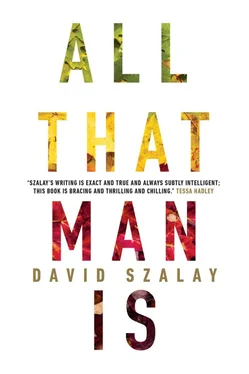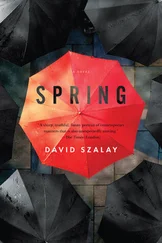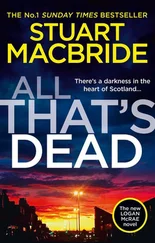He is in an unfamiliar room. The light is dim. It seems to be evening, or very early morning. He is lying on a bed, looking up at the ceiling, high above him. There is something up there, some sort of light fitting. Maggio, frutti e fiori. Giugno, vado al mare …His head feels very heavy, foggy. Ottobre, con la nebbia . He does not know where he is. From somewhere on the other side of a door, he hears what seem to be footsteps, voices. The door has a panel of frosted glass in it, and figures slide across it sometimes, dark smudges, animating the facets of the panel for a moment. Amemus eterna et non peritura .
It is sunny in the room. Joanna is sitting there. ‘Hello, Tony,’ she says.
‘Hello,’ he says.
‘You don’t know where you are,’ she suggests.
She looks tired, he thinks. He says, ‘No. Where am I?’
‘You’re in hospital, in Ravenna.’
‘Aren’t you supposed to be in New York?’ he asks.
‘Yes, I am.’
She is sitting on a chair next to the bed.
‘And I have to go in a couple of days,’ she says.
‘Okay.’ He still feels woozy and it takes him a while to ask the obvious question: ‘Why am I here?’
‘You don’t remember anything?’
He tries. Then he says, ‘I was at Pomposa abbey. Wasn’t I?’
‘There was an accident. The Passat’s a write-off,’ she informs him.
‘What accident?’
‘They seem to think what happened,’ she says, ‘is you were pulling out of a minor road, and trying to turn left, and a truck was coming, and someone was overtaking it, and you didn’t see them until it was too late.’
There is a longish silence.
‘I don’t remember any of that,’ he says.
‘Well, you ended up in a field, apparently. And if it wasn’t for the airbags we wouldn’t be talking now. You’ve got concussion, the doctor says.’
‘Concussion?’
‘Yes. I think they want to do a CAT scan tomorrow, just to make sure there’s nothing else.’
He feels slightly nauseous. He lies back on the pillow — he has been half-sitting up to talk to her.
‘The car’s in my name,’ she says. ‘That’s how they found me.’
He is staring at the light fitting on the ceiling. His eyes follow the wire across the ceiling to the wall over the door, and then along the top of the wall to a small hole in one of the other walls. He feels strange.
‘I’ve brought you some things,’ she says. ‘Pyjamas and so on.’
‘Okay. How are you?’ he asks vaguely.
The question sounds odd. She hesitates. ‘Fine,’ she tells him. Then she says, maybe feeling that that wasn’t enough, ‘You know how it is, at this time of year.’
He struggles to remember what time of year it is.
Joanna seems distracted by something and turns her head, though in fact there is nothing there, only the pale impersonal space of the small hospital room.
There is, undoubtedly, an awkwardness to this. The way they have lived, for twenty years or more, makes it awkward. They have each looked after themselves, more or less, for all that time. They have not often had to ask the other for help — and when they did it was in a worldly tone, as negotiating equals, and in practical matters — loans, professional favours. Not like this.
Tony seems helpless and dopey in the bed, wearing a hospital smock with a number tattooed on the fabric near his shoulder.
‘I flew out last night,’ she says, turning to him again from the oddly low sink. ‘Ryanair. From Stansted.’
He doesn’t seem interested. ‘Yes?’
‘You know — the flight that gets in about midnight.’
He does know that flight. He arrived on it himself, only a few days ago. The taxi from Bologna airport to the house, half an hour through the wintry darkness. And the house, unused for months, the temperature of a fridge, the olive oil opaque and waxy. Mouse droppings on the floor. Signs of damp in the wall at the foot of the stairs. They had made him feel overwhelmed, somehow, those things. The mouse droppings, the spreading patch of damp. Still in his coat he had sat down on the small sofa in the hall, his breath hanging in the air in front of his mouth…
‘Do you want me to stay?’ Joanna’s voice says.
She is standing now, at the window, looking out. He does not know what there is to see. When he says nothing, she says, ‘The doctor did say at this stage you just need rest. You should try and sleep, he said.’
‘Okay.’
‘Do you want me to stay?’ she asks again, moving the emphasis slightly to the word stay this time.
She sits, again, in the chair — a low chair of scruffy green fabric — waiting for him to answer.
‘No, it’s okay,’ he says.
‘You should try and sleep,’ she advises.
‘Yes.’
She takes his hand for a moment. That too feels awkward, holding his dry hand like that. She isn’t sure why she took it. The physical intimacy of it feels excessive, anyway, now that she is holding it. She understands that she has no feel for what to do in this situation. They have lived merely as friends for so many years. She isn’t sure what she owes him in a situation like this. There is no precedent for it. The heart op — that long hospital stay — was all organised and prearranged and in the familiar surroundings of West London. She didn’t have to fly across Europe overnight at no notice to appear at his side, surprising him, as she did today. She didn’t have to tell him where he was, and what had happened to him. He never seemed as helpless then as he does now. She had wondered, on the plane, whether she needed to do this, whether it was her place any more. If she didn’t do it, though, who would? She is still holding his hand. She squeezes it — out of embarrassment more than anything else — and puts it down.
‘I’ll look in tomorrow morning,’ she says.
‘Okay.’ He wonders what time of day it is now.
She puts her coat on. It seems to take for ever. Then she says again, ‘I’ll look in tomorrow.’
She has already opened the door, letting in noise from outside, when he says, ‘Joanna.’
She stops in the doorway, very aware now of how much she wants to leave.
‘Thank you.’
She doesn’t know what to say. ‘That’s alright,’ she says finally, and leaves.
—
An hour or two later — it is already dark outside, the light on the ceiling is on — a doctor arrives. He is very young. Not much more than thirty, by the look of it. A nice-looking man. He asks how Tony feels. ‘Okay,’ Tony says.
‘Do you feel sick?’
‘Sometimes. A little bit.’
‘Headache?’
‘Slightly. Not really.’
The doctor says they will do a CAT scan in the morning. If everything is okay — if there is no haemorrhaging inside his head — he might be able to go home tomorrow, or perhaps the next day. ‘You have been very lucky,’ he says, smiling.
—
In the morning he feels more or less normal. He has, which he didn’t quite have before, a normal awareness of his surroundings. He is in hospital. He is very much aware of that now. Already this year he has spent many weeks in hospital. He has already spent more time in hospital this year, he thinks, than in his entire life up till now. And here he is again. He is sitting on the edge of the tall bed staring at the scuffed grey floor. And there’s just going to be more and more of this, isn’t there? Hospitals. Doctors. His only purpose in life now, it seems, is to stave off physical decay and death for as long as possible. His life, in terms of any sort of positive purpose, would seem to be over already. He feels very depressed. Amemus eterna et non peritura . The words pass through his mind from somewhere. Painfully, he eases himself off the bed and plants his pale feet on the floor. The sink is two light-headed steps away. Over it there is a mirror. His face is a shock. No one told him about that. ‘Fucking hell,’ he says, furious. He stands there for a few seconds, leaning on the sink until his head stops spinning. The tap is weird — a horizontal lever about six inches long. He fiddles with it until water starts to flow. Fills one of the plastic cups and lifts it to his split, disfigured lip.
Читать дальше












